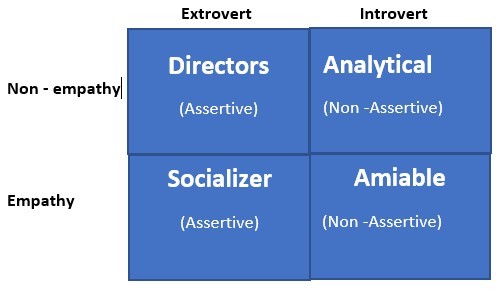Have you been ever told by someone that, the so and so job suits you the best? Well, then you are at the right place. Your personality speaks volumes about which job role you will excel in. Personalities have the power to shape our careers. That’s why it’s important to identify yours and play to its strengths. The truth is that the personality that one develops comes with inherent qualities. Certain job profiles need 40 % of those inherent qualities. So, if you take up a job that suits your personality, then you are deemed to taste success. On the contrary, if you land up with a job that is opposite to what your inner personality is, then you may feel restrained and suffer from job dissatisfaction. Taking up a job matching your personality increases your chances of tasting success by 65%.
Job matching candidate’s personality is now determined by conducting a Psychometric test, a way to gauge the right job for the right candidate. It is important to pay a bit of attention to this personality matrix to know your future dream job profiles and get the right job matching done.
Table of Contents
Personality matrix
Different personality types are well-suited for different job positions. That is why the personality matrix is used to analyze one’s personality, and to find what jobs that person would excel in. The goal of the Personality Matrix is to help people understand themselves and their potential and find a career that best fits their individual needs. The idea behind the Personality Matrix test is similar to identifying your interests, strengths, and weaknesses so you can pursue a career that matches your individual needs.

Above is what the personality matrix looks like. It speaks volumes about the kind of personality a person has and what are the characteristics. Job matching done through a personality matrix will go a long way in landing the right job.
- Directors – They are extroverts with less emotional quotient. They are outspoken and usually believe in voicing their feelings. They are well-versed in getting the work done by others. They follow a delegative style of leadership. Successful as a manager in companies.
Job matching – Managerial role with more delegation authority. sales manager, HR, training and development roles, collection job, project manager.
- Analytical – The person has strong logical reasoning. He or she is very shy, and not much outspoken. Prefers working as an individual contributor to companies. Is successful in job roles like data analysis, programming, etc. They lack emotions though. They love being alone.
Job matching – Data analytics, research, coding, developer, programmer, business intelligence.
- Socializers – They have empathy towards others. Very outspoken, and talkative. They have a good social network. They are outstanding team players. They can make quick friends and grow their network. They are outgoing.
Job matching – Influencer, sales, marketing, Entertainment industry, affiliate marketers.
- Amiable – they are introverted, reserved, yet empathic. They are friendly but to a limited extent. They make friends but they are not loud. They also make good team players and get along well with others.
Job matching – Team lead, credit research, FP&A, financial analyst, content writer, tutor.
A personality matrix, also known as a personality test, is an assessment tool that is used to measure one’s personality. The purpose of the matrix is to provide an accurate understanding of one’s personality and how it impacts their behavior and thoughts.
The benefits of using a personality matrix are numerous. For one, the results are reliable and can be easily interpreted. The data collected from this assessment can also be used for career guidance, counseling, and psychotherapy. This type of testing can also help people understand themselves better by providing them with insights into their strengths and limitations as well as their likes and dislikes. A personality matrix goes a long way to help find a good job fit.

Personal interview questions and answers for job matching:
HRs are clever, they ask you questions whose answers will help them, deep-dive, into your real personality. These are tricky questions with neither a right nor wrong answer. Below are some of them and how you should answer them:
Q – Do you think crying is a sign of weakness or strength?
A – Crying is a sign of expression, expressing feelings is not a weakness for sure.
Q – What would you choose to go on vacation or go to your parent’s home to see them?
A – Going to our parent’s homes to see them and take them on vacation along with us.
Q – What excites you more shopping or watching TV?
A – Prefer shopping as Shopping is a great experience where we purchase, talk to people, bargain, or go around.
Q – If you could have superpowers, would you use them for good or for evil?
A – I would use my superpowers for good, and to win over evil.
Q – Would you rather discover something great and share it? Or discover something evil and prevent it?
A – I would prefer to discover something great to share it with others to motivate or inspire them. The world is full of sorrows, so do not want to add to it.
Q- What do you want to be remembered for?
A – I want to be remembered for bringing a smile to someone’s smile and for all the good deeds that would have positively impacted anyone’s life in any way possible.
Q – What would it be about if you had your own TV network?
A – My TV network will focus on how to achieve financial freedom and become financially independent.
Q – If you had an extra hour every day, what would you do with it?
A – I would invest in learning something new be it a new tool, or a new app to increase my knowledge.
Q – If you could be someone of the opposite sex for a day, what would be the first thing you do?
A – I would see myself in the mirror and ensure a good start.
Q – If you’re in a bad mood, do you prefer to be left alone or have someone cheer you up?
A – I would surely love to be in the company of someone who would cheer me up.
Q – In what ways are you the same as your childhood self?
A – I find happiness in simple things like nurturing plants, enjoying the rain, and petting dogs.
Q – Would you accept the gift of reading other people’s minds if it meant you could never turn it off?
A – Yes I would love the gift of reading other people’s minds as it will help me be a step ahead and escape backstabbers.
Q – Would you rather spend 48 straight hours in a public restroom or spend the next 2 months taking only public transportation?
A – I would prefer taking public transport for the next 2 months as it’s low on pockets, which helps socializing.
Q – How old would you be if you didn’t know how old you are?
A – I would love to be a teenager, age is just the number, it’s all about how old you feel at heart.
Q – Would you rather have more than 5 friends or fewer than 5 friends?
A – I would prefer fewer than 5 friends who are compatible, genuine, and friends forever material rather than having quantity over quality.
Finding your perfect job isn’t just about matching your skillset. It’s not just about money either. There’s one thing that we often overlook when searching for our dream job which is our personality.
Examples of using job matching techniques to get a suitable job for yourself
Using job matching techniques effectively can help you find a job that aligns with your skills, interests, and career goals. Here are steps to help you get a job that suits you, along with examples:
- Self-Assessment:
- Step: Begin by assessing your skills, strengths, interests, and career objectives. Identify your values and what type of work environment you prefer.
- Example: If you have strong analytical and problem-solving skills and enjoy working in a team, you might be suited for roles in data analysis or project management.
- Networking:
- Step: Build a professional network by attending industry events, connecting with peers, and utilizing online platforms such as LinkedIn. Engage with professionals in your field to learn about job opportunities.
- Example: Attend conferences or webinars related to your industry and connect with speakers and fellow attendees. Mention your job search and inquire about potential openings.
- Online Job Search:
- Step: Use job search engines, job boards, and company websites to find job openings that match your qualifications and preferences. Utilize filters to narrow down your search.
- Example: If you’re interested in a marketing role, you can search for “digital marketing jobs” on popular job search platforms and use location filters to find positions in your desired city.
- Company Research:
- Step: Research companies that align with your values, culture, and work preferences. Review their websites, social media presence, and employee reviews.
- Example: If you value work-life balance and a collaborative culture, research companies that emphasize these qualities, and focus your applications on those organizations.
- Personal Branding:
- Step: Enhance your personal brand by creating an optimized LinkedIn profile and an online portfolio (if applicable). Highlight your skills, achievements, and experiences.
- Example: Use your LinkedIn profile to showcase projects you’ve worked on and your expertise in your field. Connect with professionals in your industry and engage in relevant discussions.
- Skill Development:
- Step: Continuously develop your skills and stay updated on industry trends. Consider taking online courses, attending workshops, or obtaining relevant certifications.
- Example: If you’re in the technology sector, you can enroll in online courses on programming languages or emerging technologies to enhance your skill set.
- Professional Associations:
- Step: Join professional organizations related to your industry. These groups often provide access to job postings, networking events, and opportunities for skill development.
- Example: If you’re in the field of healthcare, consider joining associations like the American Medical Association or the American Nurses Association to access job listings and network with peers.
- Leverage Your Alumni Network:
- Step: Connect with your college or university’s alumni network. Alumni often share job openings, mentorship opportunities, and industry insights.
- Example: Reach out to alumni in your field through platforms like LinkedIn or your university’s alumni association. Mention your job search goals and ask for advice or referrals.
- Internships and Freelancing:
- Step: Consider internships or freelance work to gain experience, build your network, and explore different roles before committing to a full-time job.
- Example: If you’re considering a career in graphic design, take on freelance projects to build your portfolio and gain real-world experience.
- Resume Tailoring:
- Step: Customize your resume and cover letter for each job application. Emphasize your skills, experiences, and accomplishments that directly relate to the job description.
- Example: If you’re applying for a project management role, highlight your previous project management experience, relevant certifications, and successful project outcomes.
- Interview Preparation:
- Step: Practice for job interviews by researching common interview questions, preparing answers, and conducting mock interviews with friends or mentors.
- Example: Prepare concise, specific examples that showcase your relevant skills and experiences, especially those highlighted in the job description.
By following these steps and tailoring your job search to your unique skills and preferences, you can increase your chances of landing a job that suits you and your career goals. It’s essential to be patient, persistent, and adaptable in your job search process.
How job matching helps in achieving work life balance?
Job matching plays a crucial role in achieving work-life balance by helping individuals find job opportunities that align with their values, preferences, and priorities. Here’s how job matching contributes to work-life balance:
- Alignment with Personal Values:
- Job matching takes into account an individual’s personal values, such as the importance of family, personal time, and well-being. When a job aligns with these values, it’s more likely to support work-life balance.
- Flexible Work Options:
- Job matching can help individuals identify positions that offer flexible work arrangements, such as remote work, part-time schedules, or flexible hours, which can accommodate personal and family needs.
- Cultural Fit:
- Job matching takes into consideration a company’s culture. Finding a workplace culture that values work-life balance can lead to a more harmonious work environment and reduced stress.
- Short Commutes:
- Job matching can help individuals find jobs closer to home, reducing commute times and allowing for more personal and family time.
- Sustainable Workloads:
- Job matching can assist in identifying roles with manageable workloads that don’t require excessive overtime or constant high-pressure situations, allowing for better work-life balance.
- Clear Job Expectations:
- Clear job descriptions and expectations help individuals understand the requirements of the position, preventing surprises and reducing work-related stress.
- Health and Well-Being:
- Job matching can consider the impact of the job on an individual’s physical and mental health. Finding a job that promotes well-being and health can contribute to work-life balance.
- Skills and Interests:
- When individuals are matched with jobs that align with their skills and interests, they are more likely to enjoy their work, reducing stress and improving overall well-being.
- Negotiating Benefits:
- A good job match allows individuals to negotiate benefits that support work-life balance, such as paid time off, family leave, or childcare assistance.
- Reduced Burnout:
- By avoiding jobs that are mismatched to skills, interests, or values, individuals are less likely to experience burnout, which can disrupt work-life balance.
- Improved Time Management:
- Job matching can result in roles where skills are effectively utilized, enabling individuals to complete tasks efficiently, leading to better time management and less stress.
- Personal Growth Opportunities:
- Job matches that offer personal growth and development opportunities can lead to greater job satisfaction and improved work-life balance.
- Psychological Well-Being:
- A good job match can positively impact an individual’s psychological well-being, reducing work-related stress and promoting a healthy work-life balance.
In summary, effective job matching helps individuals find positions that are better suited to their personal and professional needs. It contributes to work-life balance by reducing stress, improving job satisfaction, and providing opportunities for personal and family time. By considering the factors that matter most to you, job matching can lead to a healthier, more balanced life.
FunFact:
As per the survey, the interviewers ask situational questions to ensure the right job matching with the right candidate based on their skill sets. Psychometric tests are used by only 25% of companies since they believe the test may not give accurate results.
Let us know if you were asked any personal questions like the above for job matching?

